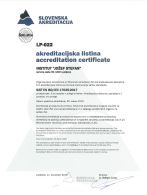LMR
Accreditation Certificate LP-022
Annex to the Accreditation Certificate LP-022
Type of scope: flexible (possibility of implementing minor modifications of the method)*
Site: in the laboratory
Testing fields with reference to the type of test: radiochemistry, radiation (alfa, beta, gamma spectrometry, radiation protection measurements)
Testing fields with reference to the type of test item: environment and samples from the environment (water, ground, air, wastes, environment), foodstuffs, biological samples, fuels and lubricants, agricultural products, wood, tobacco products, construction products, materials and structures, industrial materials and products, chemicals, chemical products, cosmetics, plastic and rubber, textile and leather, glass, ceramics, paper, paperboard and packaging
| No. | Identification of the document, describing the testing method | Characteristic or parameter tested | Description of test (type of test, test principle or technique) | Range of testing | Items tested (materials, products) |
|---|---|---|---|---|---|
| 1. | LMR-DN-10 ** / ver. 14 (Dec. 2021) in-house method | Content of radionuclides: Radionuclides emitting gamma- and X-rays in energy range: Sample dimension: from point source to (Φ111 × 60) mm3 in cylindrical geometry | High-resolution gamma-ray spectrometry | Range from 0.005 Bq/kg or from 1.0·10-6 Bq/m3 (aerosol filter) depends on radionuclide and material Detection limit and other characteristic limits are determined according to ISO 11929:2019. Measurement uncertainty (expressed as relative value k=1): ≥3 % | Solid and liquid materials |
| 2. | ELME-DN-23 *** / ver. 06 (Oct. 2024) internal method | Content of radionuclides: Radionuclides emitting gamma- and X-rays in energy range: Sample dimension: from point source to (Φ111 × 60) mm3 in cylindrical geometry | Measurements of activities of gamma-ray and x-ray emitters for characterisations of reference materials | Range (0,02 Bq/kg–100 kBq/kg) or (0,02 Bq/L–100 kBq/L) depends on radionuclide and material Detection limit and other characteristic limits are determined according to ISO 11929:2019. Measurement uncertainty (expressed as relative value k=2): ≥6 % | solid and fluid materials |
* Laboratory can implement minor modifications of the method as necessary (e.g. adaptation to the new version). Details on the actual state of the scope are maintained by the laboratory.
** Results of the measurements of activities of gamma-ray and x-ray emitters with gamma-ray spectrometry are reported in following units: Bq/sample, Bq/m3 for liquid samples and aerosol filters, Bq/kg for solid and liquid samples and Bq/m2 for precipitation and soil samples (deposit). Range of testing and detection limits depends on radionuclides and the type of material (sample matrix). For selected radionuclides and materials at typical measurement times and sample quantities the expected detection limits are available on web page of the laboratory here. Additional information are available upon request in the laboratory.
In December 2021 the regular update of the procedure was performed, the procedure was harmonized with the work performance in the laboratory. Beside this some additional descriptions of analyses in special cases were described.
*** Results of the measurements of activities of gamma-ray and x-ray emitters with gamma-ray spectrometry for characterisation of reference materials are reported in following units: Bq/sample, Bq/m³ for liquid samples and aerosol filters, Bq/kg for solid and liquid samples and Bq/m² for precipitation and soil samples (deposit). Range of testing and detection limits depend on radionuclides and type of material (sample matrix). These data are available upon request in the laboratory. The data for selected radionuclides and materials are available here.
In October 2024 the update of the procedure was performed. The determination of the Ra-226 activity is more precisely described.
Updated: 5-11-2024
